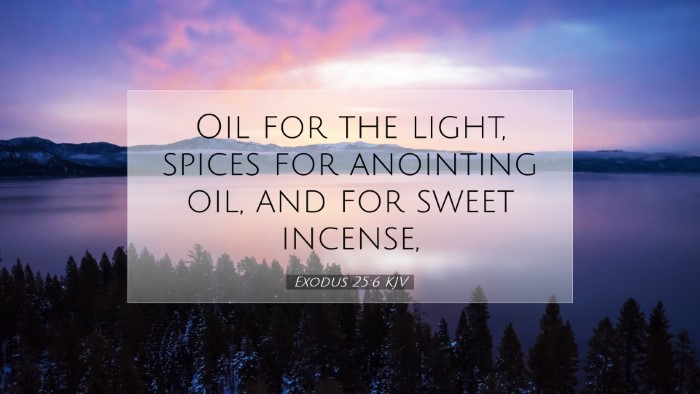Commentary on Exodus 25:6
Verse Text: "Oil for the light, and spices for anointing oil, and for sweet incense."
Introduction
Exodus 25:6 is part of the instructions given to Moses regarding the construction of the Tabernacle, a significant setting for God's presence among His people. This verse highlights three specific items critical for worship: oil, spices for anointing, and incense. Each has unique significance that reveals deeper theological truths.
Oil for the Light
The provision of oil for the light is essential for illuminating the Holy Place of the Tabernacle. The lamps, fueled by this oil, symbolize the presence and guidance of God.
-
Symbolism of Light: In biblical theology, light often represents divine truth, holiness, and the presence of God. Matthew Henry notes that the lamp's oil points to the Holy Spirit's illumination of believers' hearts, granting them understanding and wisdom (Henry, Commentary on the Whole Bible).
-
Practical Significance: The necessity of continual oil indicates that there is a need for a consistent supply of spiritual nourishment, fostering growth and reflection among worshippers. Albert Barnes emphasizes that the oil's continual replenishing is a metaphor for the need for habitual filling of the Spirit in a believer's life (Barnes, Notes on the Old Testament).
Spices for Anointing Oil
The mention of spices for anointing oil introduces us to the sacredness of anointing in Israelite worship. Anointing oil was a critical aspect of consecration, set apart for holy purposes.
-
Spiritual Consecration: Adam Clarke highlights that the anointing oil functions as a means of consecrating both people and objects for divine service, enabling them to be used in a sacred context (Clarke, Clarke's Commentary). This act of anointing symbolizes the setting apart of individuals, including priests and kings, for God’s special tasks.
-
Foreshadowing Christ: The spices mixed into the anointing oil can also be seen as a prefiguration of Christ, who is the ultimate Anointed One. The use of aromatic spices suggests both the beauty and the value of Christ's character and His ministerial work. As such, the anointing oil elevates the significance of Jesus’ ministry as the Messiah.
Sweet Incense
Lastly, the inclusion of sweet incense symbolizes prayer and worship ascending to God. Incense has been interpreted as a representation of the prayers of the saints.
-
Symbolic Meaning of Incense: Incense, when burned, releases a fragrant aroma. This visual and olfactory symbol draws connections to how worship is to be pleasing to God. Matthew Henry remarks on the concept of prayers being like incense, rising to heaven, a sweet offering unto the Lord (Henry, Commentary on Exodus).
-
Connection to Worship: The incorporation of incense within the Tabernacle setting emphasizes the importance of worship being conducted in a manner that is both reverent and fragrant before God. Albert Barnes stresses that the act of burning incense represents a heart's desire to connect with God and to bring Him glory through sincere worship (Barnes, Notes on the Old Testament).
Theological Reflections
This verse succinctly encapsulates elements of spiritual vitality, dedication, and worship dynamics that remain relevant today.
-
Vitality in Christian Life: The essential nature of oil and its continual availability drives home the need for a vibrant spiritual life, one that relies on the Holy Spirit for illumination and strength.
-
Dedication to God: The anointing oil signifies that all aspects of believers' lives should be set apart for God's service, underscoring the call to holiness in every believer's walk.
-
Commitment to Worship: The call to offer sweet incense affirms the call for believers to engage in worship that pleases God and emanates the fragrance of Christ's presence in their lives.
Conclusion
In summary, Exodus 25:6 serves as a rich source of theological insight. The oil, anointing spices, and incense reflect essential themes of illumination, consecration, and worship in light of God’s holy presence. Through the lens of these ancient practices, contemporary believers can cultivate a deeper understanding of their relationship with God, engage in Spirit-filled living, and partake fully in worship that transcends elements of mere rituality, focusing instead on heartfelt devotion.


